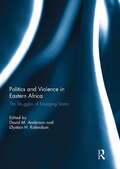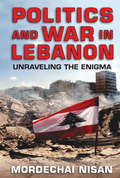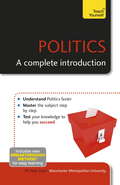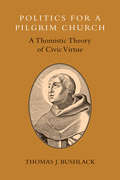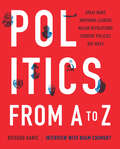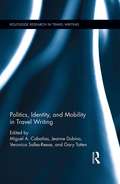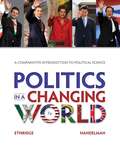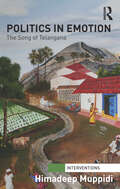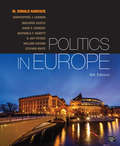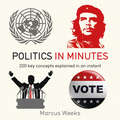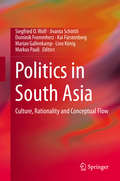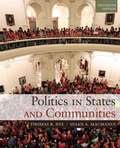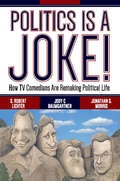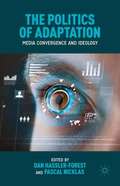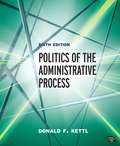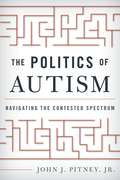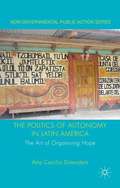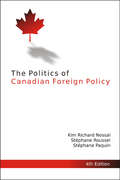- Table View
- List View
Politics and the Sacred
by Harald WydraThis path-breaking book argues that practices of the sacred are constitutive of modern secular politics. Following a tradition of enquiry in anthropology and political theory, it examines how limit situations shape the political imagination and collective identity. As an experiential and cultural fact, the sacred emerges within, and simultaneously transcends, transgressive dynamics such as revolutions, wars or globalisation. Rather than conceive the sacred as a religious doctrine or a metaphysical belief, Wydra examines its adaptive functions as origins, truths and order which are historically contingent across time and transformative of political aspirations. He suggests that the brokenness of political reality is a permanent condition of humanity, which will continue to produce quests for the sacred, and transcendental political frames. Working in the spirit of the genealogical mode of enquiry, this book examines the secular sources of political theologies, the democratic sacred, the communist imagination, European political identity, the sources of human rights and the relationship of victimhood to new wars.
Politics and Violence in Eastern Africa: The Struggles of Emerging States
by David M. Anderson and Øystein H. RolandsenOver the fifty years between 1940 and 1990, the countries of eastern Africa were embroiled in a range of debilitating and destructive conflicts, starting with the wars of independence, but then incorporating rebellion, secession and local insurrection as the Cold War replaced colonialism. The articles gathered here illustrate how significant, widespread, and dramatic this violence was. In these years, violence was used as a principal instrument in the creation and consolidation of the authority of the state; and it was also regularly and readily utilised by those who wished to challenge state authority through insurrection and secession. Why was it that eastern Africa should have experienced such extensive and intensive violence in the fifty years before 1990? Was this resort to violence a consequence of imperial rule, the legacy of oppressive colonial domination under a coercive and non-representative state system? Did essential contingencies such as the Cold War provoke and promote the use of violence? Or, was it a choice made by Africans themselves and their leaders, a product of their own agency? This book focuses on these turbulent decades, exploring the principal conflicts in six key countries – Kenya, Uganda, Sudan, Ethiopia, Somalia and Tanzania. This book was published as a special issue of the Journal of Eastern African Studies.
Politics and War in Lebanon: Unraveling the Enigma
by Mordechai NisanLebanon is an exceptionally misunderstood country; its religious politics are typically misrepresented and denigrated in Western political commentary. Politics and War in Lebanon offers a lucid examination of Lebanese society and politics. Mordechai Nisan examines Lebanon in its own termson its own cultural turf. He then points to the causes of political disintegration in 1975 and explores the capacity of Lebanon to recover and retain its unique national poise.Avoiding disorienting Western stereotypes, Nisan presents Lebanon in its own native frame of reference, as a multi-ethnic country that operates according to its immutable and enigmatic political forms. Lebanon is different from other Arab countries, as demonstrated through its very complex electoral system, its tradition of cross-elite cooperation, and its special sense of Lebanese national identity that differentiates it from its overbearing Syrian neighbor.Nisan explores intra-Maronite Christian feuds, identifies Syria's occupation strategy, analyzes the violence of the Palestinians, and studies Israel's failed policy strategy and the role of Hezbollah in the Lebanese power equation. Lebanon is caught between its special historical identity as a country ofpoise, creativity, and liberty and the interminable warfare in the streets and villages of the country. Although its future appears dim, its resilience enabled it to prevail in the past, and may yet continue to do so.
Politics: A Complete Introduction: Teach Yourself
by Peter JoyceThis is your go-to guide to politicsAs the UK gears up for a snap general election on the back of a hotly contested and divisive referendum, there has never been a better time to discover more about politics and how it works. Politics: A Complete Introduction explains everything you need to know, giving you a comprehensive and easy-to-understand introduction to a complex subject. Inside you will learn about different political ideologies and systems, referendums, elections and electoral systems, political parties and party systems, protest, the media and politics, constitutions and human rights, what the courts do, and how the machinery of government is organised. It also covers the nation state in the modern world and international terrorism. Politics: A Complete Introduction is a jargon-free guide that will get you informed, fast.
Politics for a Pilgrim Church: A Thomistic Theory of Civic Virtue
by Thomas J. BushlackPresents an innovative, constructive alternative to Christian involvement in the "culture wars" Church leaders and scholars have long wrestled with what should provide a guiding vision for Christian engagement in culture and politics. In this book Thomas Bushlack argues that a retrieval of Thomas Aquinas's understanding of civic virtue provides important resources for guiding this engagement today. Bushlack suggests that Aquinas's vision of the pilgrim church provides a fitting model for seeking the earthly common good of the political community, and he notes the features of a Thomistic account of justice and civic virtue that remain particularly salient for the twenty-first century. The book concludes with suggestions for cultivating a Christian rhetoric of the common good as an alternative to the predominant forms of discourse fostered within the culture wars that have been so divisive.
Politics for a Pilgrim Church: A Thomistic Theory of Civic Virtue
by Thomas J. BushlackPresents an innovative, constructive alternative to Christian involvement in the "culture wars" Church leaders and scholars have long wrestled with what should provide a guiding vision for Christian engagement in culture and politics. In this book Thomas Bushlack argues that a retrieval of Thomas Aquinas's understanding of civic virtue provides important resources for guiding this engagement today. Bushlack suggests that Aquinas's vision of the pilgrim church provides a fitting model for seeking the earthly common good of the political community, and he notes the features of a Thomistic account of justice and civic virtue that remain particularly salient for the twenty-first century. The book concludes with suggestions for cultivating a Christian rhetoric of the common good as an alternative to the predominant forms of discourse fostered within the culture wars that have been so divisive.
Politics from A to Z
by Richard GanisDeepen your understanding of how politics work, and why they matter, with this timely guide. Politics from A to Z provides an up-to-date, thoroughly researched glossary of political topics spanning ancient Greece to contemporary America. Featuring an introductory interview with Noam Chomsky, Politics from A to Z is ideal for anyone interested in politics, from beginners to scholars. With detailed entries, visual references, and useful timelines, Politics from A to Z introduces the influential figures and ideas that have shaped politics, from the American Revolution to Zionism.
Politics, Identity, and Mobility in Travel Writing (Routledge Research in Travel Writing)
by Jeanne Dubino Miguel A. Cabañas Veronica Salles-Reese Gary TottenThis collection examines the intersections between the personal and the political in travel writing, and the dialectic between mobility and stasis, through an analysis of specific cases across geographical and historical boundaries. The authors explore the various ways in which travel texts represent actual political conditions and thus engage in discussions about national, transnational, and global citizenship; how they propose real-world political interventions in the places where the traveler goes; what tone they take toward political or socio-political violence; and how they intersect with political debates. Travel writing can be viewed as political in a purely instrumental sense, but, as this volume also demonstrates, travel writing’s reception and ideological interventions also transform personal and cultural realities. This book thus examines the ways in which politics’ material effects inform and intersect with personal experience in travel texts and engage with travel’s dialectic of mobility and stasis. In spite of globalization and efforts to eradicate the colonial vision in travel writing and in travel writing criticism, this vision persists in various and complex ways. While the travelogue can be a space of discursive and direct oppression, these essays suggest that the travelogue is also a narrative space in which the traveler employs the genre to assert authority over his or her experiences of mobility. This book will be an important contribution for interdisciplinary scholars with interests in travel writing studies, global and transnational studies, women’s studies, multicultural studies, the social sciences, and history.
Politics In A Changing World, Seventh Edition
by Marcus E. Ethridge Howard HandelmanProviding a foundation for a comparative understanding of political life, POLITICS IN A CHANGING WORLD includes in-depth chapters on political science concepts (ideology, political culture, interest groups, governmental institutions, parties) followed by a series of brief country studies. The concepts and country studies help students acquire a better understanding of the actors and institutions that play a part in diverse political systems, how and why they act in relation to one another, and what their actions mean for the political system and its citizens. The Seventh Edition is thoroughly updated throughout, including coverage of the global economic crisis, the 2012 United States election, the Conservative Party-Liberal Democratic Party coalition and the victory of a new Conservative Prime Minister in Great Britain, and the democratic upheavals in Egypt and elsewhere in the Arab world.
Politics in Commercial Society
by Istvan Hont Béla Kapossy Michael SonenscherScholars normally emphasize the contrast between the two great eighteenth-century thinkers Jean-Jacques Rousseau and Adam Smith. Rousseau is seen as a critic of modernity, Smith as an apologist. Istvan Hont, however, finds significant commonalities in their work, arguing that both were theorists of commercial society and from surprisingly similar perspectives.<P><P> In making his case, Hont begins with the concept of commercial society and explains why that concept has much in common with what the German philosopher Immanuel Kant called unsocial sociability. This is why many earlier scholars used to refer to an Adam Smith Problem and, in a somewhat different way, to a Jean-Jacques Rousseau Problem. The two problems―and the questions about the relationship between individualism and altruism that they raised―were, in fact, more similar than has usually been thought because both arose from the more fundamental problems generated by thinking about morality and politics in a commercial society.<P> Commerce entails reciprocity, but a commercial society also entails involuntary social interdependence, relentless economic competition, and intermittent interstate rivalry. This was the world to which Rousseau and Smith belonged, and Politics in Commercial Society is an account of how they thought about it.
Politics in Emotion: The Song of Telangana (Interventions)
by Himadeep MuppidiThe work focuses on a subaltern local sovereignty movement called "Telangana" in India. Over the last ten years, this movement has engaged in a massive political mobilization, including strikes, rallies, work stoppages, occupation of public spaces, electoral contests, 200 and more political suicides and media battles. But, interestingly enough, notwithstanding a political mobilization that has brought day-to-day life to a halt on a number of occasions, it has remained largely invisible in international media and global politics. Fascinated by the social movement’s international invisibility as well as the causes and conditions of its eruption around a city/region that has become a showcase of new capitalist development, Muppidi seeks to unpack this issue, showing that this invisibility is not just intrinsically puzzling, but also represents the operation of power on a global scale. Investigating the conditions of invisibility in this instance can therefore tell us something important about the way global power works to produce visibility and invisibility in the 21st century world. This book provides a unique resource for students of Postcolonalism, International relations and South East Asian studies.
Politics in Europe
by David P. Conradt Robert Leonardi Raffaella Y. Nanetti M. Donald Hancock Christopher J. Carman Marjorie Castle William N. Safran Stephen L. WhiteThoroughly updated, this sixth edition of Hancock et al.’s Politics in Europe remains an approachable yet rigorous introduction to the region—the UK, France, Germany, Italy, Sweden, Russia, Poland, and the European Union. Its strong analytic framework and organization, coupled with detailed country coverage written by country experts, ensure that students not only get a robust introduction to each country, but also are able to make meaningful cross-national comparisons. Key updates include the latest in European politics, including recent election results, the content and impact of the Eurozone crisis, the emergence of a new “Nordic model” of welfare capitalism, and coverage of key social and political issues including globalization, terrorism, immigration, gender, religion, and transatlantic relations.
Politics in Europe
by M. Donald Hancock Christopher J. Carman Marjorie Castle David P. Conradt Raffaella Y. Nanetti Robert Leonardi William N. Safran Stephen L. WhiteThoroughly updated, this sixth edition of Hancock et al.’s Politics in Europe remains an approachable yet rigorous introduction to the region—the UK, France, Germany, Italy, Sweden, Russia, Poland, and the European Union. Its strong analytic framework and organization, coupled with detailed country coverage written by country experts, ensure that students not only get a robust introduction to each country, but also are able to make meaningful cross-national comparisons. Key updates include the latest in European politics, including recent election results, the content and impact of the Eurozone crisis, the emergence of a new “Nordic model” of welfare capitalism, and coverage of key social and political issues including globalization, terrorism, immigration, gender, religion, and transatlantic relations.
Politics in Minutes: 200 Key Concepts Explained In An Instant (In Minutes)
by Marcus WeeksQuick, accessible, compact guide to understanding key political concepts. Contents include: Liberty, Justice, Equality, Human rights, Social contract, Democracy, Monarchy, Anarchism, Capitalism, Socialism, Nationalism and Globalisation.
Politics in South Asia
by Siegfried O. Wolf Jivanta Schöttli Dominik Frommherz Kai Fürstenberg Marian Gallenkamp Lion König Markus PauliThe book introduces central themes that have preoccupied the field of South Asian politics over the last few decades and identifies new, emerging areas of research. Presenting both general political theory and context-specific case studies, the collection draws attention to the methodological challenges of working on an area-specific theme and the importance of generating generalizable insights linked to theory. Hence it will be of interest for political scientists working on South Asian politics as well as on other non-Western societies. The collection represents an unusually broad survey of scholarship emerging from a range of leading academic centres in the field.
Politics in States and Communities
by Thomas Dye Susan MacManusPolitics in States and Communities is distinguished by its focus on politics, its comparative approach, its concern with thorough explanation, its interest in policy, and its focus on conflicts in states and communities. Several themes are carried on throughout the book that emphasize the importance of politics at the state and community level including the “conflict management” theme which emphasizes the sources and nature of conflict in society, how key decision makers act in conflict situations, and how “politicos” emerge and determine “who gets what.”
Politics Is a Joke!: How TV Comedians Are Remaking Political Life
by S. Robert LichterDoes late night political humor matter? Are late-night comedians merely entertaining, or do they have the power to influence the way we think about politics and politicians? Politics Is a Joke! situates late night comedy in the historical context of political humor and demonstrates how the public turn to this venue for political information, and are in turn affected by it. Using exclusive data collected by the Center for Media and Public Affairs, the authors conduct a detailed and exhaustive analysis of political jokes on late night TV shows dating back to 1992 in order to pinpoint the main targets and themes of late-night comedy. Politics Is a Joke! uses a wide range of examples, from jokes about politicians' physical appearance and sex scandals to jokes about Congress and even the news media, to assess and understand the impact of political humor on political institutions, politicians and their policies and behavior. Engagingly written with analysis of jokes from comedians like Jay Leno, Conan O'Brien, Jon Stewart and Stephen Colbert, Politics is a Joke! is essential reading for anyone who wants to understand the crucial role late night comedy plays in our political universe - and anyone who enjoys a good laugh.
The Politics of Adaptation
by Dan Hassler-Forest Pascal NicklasIn the 21st century, the parallel movements of media convergence and globalization have reshaped our understanding of media boundaries. The rise of digital culture has increased our access to narrative media, while also providing new ways of engaging with them. But, at the same time, global media corporations have intensified their power over these media and the channels through which they reach us. This book brings together a broad range of scholarly approaches to the challenges and opportunities of adaptation studies in this new era. Together, they focus on the political and ideological tensions that underlie and shape processes of adaptation and cultural transformation in the age of media convergence.
Politics of The Administrative Process
by Donald F. KettlThoroughly updated with new scholarship, data, and events, this text remains reader-friendly with its engaging opening vignettes and rich examples--told only the way prolific author and columnist Don Kettl can. With three case studies in every chapter, students apply ideas and analysis as they read. Useful critical thinking questions at the end of each case help shape student responses and in-class conversation.
The Politics of Advanced Capitalism
by Pablo BeramendiThis book serves as a sequel to two distinguished volumes on capitalism: Continuity and Change in Contemporary Capitalism (Cambridge, 1999) and Order and Conflict in Contemporary Capitalism (1985). Both volumes took stock of major economic challenges advanced industrial democracies faced, as well as the ways political and economic elites dealt with them. However, during the last decades, the structural environment of advanced capitalist democracies has undergone profound changes: sweeping deindustrialization, tertiarization of the employment structure, and demographic developments. This book provides a synthetic view, allowing the reader to grasp the nature of these structural transformations and their consequences in terms of the politics of change, policy outputs, and outcomes. In contrast to functionalist and structuralist approaches, the book advocates and contributes to a 'return of electoral and coalitional politics' to political economy research.
The Politics of African Industrial Policy
by Lindsay WhitfieldThis book engages in the debate on growth versus economic transformation and the importance of industrial policy, presenting a comprehensive framework for explaining the politics of industrial policy. Using comparative research to theorize about the politics of industrial policy in countries in the early stages of capitalist transformation that also experience the pressures of elections due to democratization, this book provides four in-depth African country studies that illustrate the challenges to economic transformation and the politics of implementing industrial policies.
The Politics of Autism: Navigating the Contested Spectrum
by John J. PitneyIn the first book devoted exclusively to the contentious politics of autism, noted political scientist and public policy expert John J. Pitney, Jr. , explains how autism has evolved into a heated political issue disputed by scientists, educators, social workers, and families. Nearly everything about autism is subject to debate and struggle, including its measurement and definition. Organizational attempts to deal with autism have resulted in not a single autism policy, but a vast array of policies at the federal, state, and local levels, which often leave people with autism and their families frustrated and confused. Americans with autism are citizens, friends, coworkers, sons, daughters, fathers, and mothers. No longer simply the objects of public policy, they are active participants in current policy debates. Pitney s fascinating look at how public policy is made and implemented offers networks of concerned parents, educators, and researchers a compass to navigate the current systems and hope for a path towards more regularized and effective policies for America s autism community. "
The Politics of Autonomy in Latin America
by Ana Cecilia DinersteinThe author contests older concepts of autonomy as either revolutionary or ineffective vis-à-vis the state. Looking at four prominent Latin American movements, she defines autonomy as 'the art of organising hope': a tool for indigenous and non-indigenous movements to prefigure alternative realities at a time when utopia can be no longer objected.
The Politics of Canadian Foreign Policy, Fourth Edition
by Kim Nossal Stéphane Paquin Stéphane RousselThe fourth edition of this widely used text includes updates about the many changes that have occurred in Canadian foreign policy under Stephen Harper and the Conservatives between 2006 and 2015. Subjects discussed include the fading emphasis on internationalism, the rise of a new foreign policy agenda that is increasingly shaped by domestic political imperatives, and the changing organization of Canada’s foreign policy bureaucracy. As in previous editions, this volume analyzes the deeply political context of how foreign policy is made in Canada. Taking a broad historical perspective, Kim Nossal, Stéphane Roussel, and Stéphane Paquin provide readers with the key foundations for the study of Canadian foreign policy. They argue that foreign policy is forged in the nexus of politics at three levels – the global, the domestic, and the governmental – and that to understand how and why Canadian foreign policy looks the way it does, one must look at the interplay of all three.
The Politics of Canadian Foreign Policy, Fourth Edition (Queen's Policy Studies Series #188)
by Kim Richard Nossal Stéphane Roussel Stéphane PaquinThe fourth edition of this widely used text includes updates about the many changes that have occurred in Canadian foreign policy under Stephen Harper and the Conservatives between 2006 and 2015. Subjects discussed include the fading emphasis on internationalism, the rise of a new foreign policy agenda that is increasingly shaped by domestic political imperatives, and the changing organization of Canada’s foreign policy bureaucracy. As in previous editions, this volume analyzes the deeply political context of how foreign policy is made in Canada. Taking a broad historical perspective, Kim Nossal, Stéphane Roussel, and Stéphane Paquin provide readers with the key foundations for the study of Canadian foreign policy. They argue that foreign policy is forged in the nexus of politics at three levels – the global, the domestic, and the governmental – and that to understand how and why Canadian foreign policy looks the way it does, one must look at the interplay of all three.

